Russia men's national ice hockey team
The Russian men's national ice hockey team (Russian: Сборная России по хоккею с шайбой) is the national men's ice hockey team of Russia, overseen by the Ice Hockey Federation of Russia. As of 2020, they are rated second in the IIHF World Ranking.[2] The team has been competing internationally since 1992, and is recognized by the IIHF as the successor to the Soviet Union team and CIS team. The Russian team is a member of the so-called "Big Six", the unofficial group of the six strongest men's ice hockey nations, along with Canada, the Czech Republic, Finland, Sweden and the United States.[3] The European nations of the Big Six participate in the Euro Hockey Tour, which Russia won seven times since 2005.[4] Since April 2018, the head coach is Ilya Vorobiev, taking over for the second half of the 2017–18 Euro Hockey Tour.
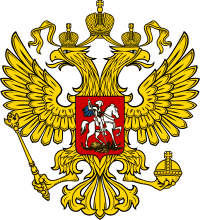 The coat of arms of Russia is the badge used on the players jerseys. | |
| Nickname(s) | Красная Машина (The Red Machine) |
|---|---|
| Association | Russian Hockey Federation |
| General Manager | Roman Rotenberg |
| Head coach | Valeri Bragin |
| Assistants | Alexei Zhamnov Alexandre Boikov Andrei Kozyrev Rashit Davydov |
| Captain | Ilya Kovalchuk |
| Team colors | |
| IIHF code | RUS |
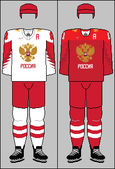 | |
| Ranking | |
| Current IIHF | 2 |
| Highest IIHF | 1 (first in 2009) |
| Lowest IIHF | 7 (2004) |
| First international | |
| Russia (Saint Petersburg, Russia; 12 April 1992) | |
| Biggest win | |
| Russia (Bratislava, Slovakia; 15 May 2019) | |
| Biggest defeat | |
| Finland (Helsinki, Finland; 22 April 1997) Russia (Moscow, Russia; 20 December 1997) | |
| IIHF World Championships | |
| Appearances | 27 (first in 1992) |
| Best result | |
| World Cup | |
| Appearances | 3 (first in 1996) |
| Best result | 4th (1996, 2016) |
| Olympics | |
| Appearances | 7 (first in 1994) |
| Medals | |
| Medal record | ||
|---|---|---|
| Representing | ||
| Olympic Games | ||
| 1998 Nagano | Team | |
| 2002 Salt Lake City | Team | |
| World Championship | ||
| 1993 Germany | ||
| 2008 Canada | ||
| 2009 Switzerland | ||
| 2012 Finland/Sweden | ||
| 2014 Belarus | ||
| 2002 Sweden | ||
| 2010 Germany | ||
| 2015 Czech Republic | ||
| 2005 Austria | ||
| 2007 Russia | ||
| 2016 Russia | ||
| 2017 Germany/France | ||
| 2019 Slovakia | ||
| Medal record | ||
|---|---|---|
| Representing | ||
| Olympic Games | ||
| 2018 Pyeongchang | Team | |
Since the establishment of the team, Russia has participated in every IIHF World Championships tournament and every Olympic ice hockey tournament, winning five world championships and one Olympic gold.[lower-alpha 1]
History
Origins
The Allrussian Hockey League was founded by some clubs in the Russian Empire and entered the International Ice Hockey Federation (IIHF) in 1911.[8] However, probably due to misunderstandings ("hockey" was identified with bandy or Russian hockey in Russia, not with the modern ice hockey rules developed in Canada) the Russian team left the organization. There were no matches involving a team from Imperial Russia.[9]
Interest in this exotic sport grew in the Soviet Union in the 2nd half of the 1940s. The first reactions were skeptical; one sports journal, Physical Culture and Sports, characterized it as such: "The game is quite individual and primitive, with few combinations, not as in bandy. Therefore, Canadian hockey should not be cultivated into our country..."[9] However, Canadian hockey became more and more popular in the Soviet Union.
The first Soviet Championships League was introduced in 1946. Two years later the Muscovian team defeated LTC Praha in their very first international game. In 1952, the Hockey Federation of the USSR joined the International Ice Hockey League, and so received the permission to play in the World Championships and the Olympics. That year is seen as the birth of the Soviet national ice hockey team, the predecessor team of the Russia men's national ice hockey team.[10] The Soviets won the 1954 Ice Hockey World Championships, and two years later they won gold at the 1956 Winter Olympics.[8]
From then until the demise of the Soviet Union in 1991, the "Red Machine" (Russian: Красная Машина; Krasnaya Mashina) was one of the most dominant teams in international play, winning nearly every World Championship and Olympic tournament,[11][8] as well as defeating many teams with professional players, such as in the 1974 Summit Series, the Super Series, and the 1981 Canada Cup. Until 1977, professional players were not able to participate in the World Championship, and it was not until 1988 that they could play in the Winter Olympics. The Soviet team was populated with amateur players who were hired by Soviet enterprises (aircraft industry, food workers, tractor industry) or organizations (KGB, Red Army, Soviet Air Force) that sponsored what would be presented as an after-hours social sports society hockey team for their workers but were set-up for the athletes to train full-time.[12][13] This type of amateur player was contested by Canada and the United States whose best players were participating in professional leagues.[14]
After the USSR's dissolution
The Soviet Union dissolved shortly before the 1992 Winter Olympics, so a Unified Team largely consisting of the former Soviet republics competed instead. The CIS national ice hockey team, consisting of 21 Russian players, 1 Lithuanian and 1 Ukrainian, competed as part of this Olympic delegation. The team finished second in its preliminary group, beating co-favorites Canada, 5–4, but losing to Czechoslovakia, 3–4. The CIS team then defeated the Finns and Americans, 6–1 and 5–2, respectively. In the final, they played Canada again, winning 3–1 and claimed the gold medal. The team was coached by the Russian and former Soviet coach Viktor Tikhonov. In later years, the IIHF recognized this gold medal as being won by the Russian national team, rather than by the CIS.[5][6] However, the International Olympic Committee has not recognized Russia as the Olympic champions for this Winter Games.
Russia joined the IIHF as an independent state on 6 May 1992, along with 10 other states, including seven other former Soviet republics. Unlike the others, which applied as new member states and had to begin playing at the bottom tiers of the World Championship, Russia was allowed to replace the Soviet Union in its position, and was thus entered into the elite division for the 1992 World Championship.[15] Russia's first actual games after the Soviet dissolution were a series of five friendly games between Sweden, Germany and Switzerland, all taking place in April 1992, the debut game occurring on 12 April 1992 against Sweden and ending in a 2–2 draw.[16] At the 1992 World Championship Russia finished first in its preliminary group but lost to Sweden in the quarterfinals, 2–0. They, however, won the next edition of the tournament, beating Germany, Canada and Sweden in the playoffs and clinching their first title as Russia and 23rd, including the USSR's totals.
The post-Soviet drought
As the USSR fell apart, so did Russia's elite hockey program. At the 1994 Winter Olympics they finished fourth overall, losing the bronze medal match to Finland. Russia also competed at the 1996 World Cup, the successor tournament to the Canada Cup, where the team lost in the semi-finals to the eventual winner, the United States. At the 1998 Winter Olympics, Russia won five consecutive games and reached the gold medal match, where they lost to the Czech Republic, 0–1.[17]
During the drought in 1994, Russian journalist Vsevolod Kukushkin reported that, "The people are upset. Russia is a nation of critics." He said the Russian team was struggling with finances to support training, no funding was received from the national level, and professional teams in Russia were struggling to stay afloat. He also reported that the Russian people were upset at losing the nation's best players to the National Hockey League, and not playing on the Russian national team.[18]
The Russian resurgence
The Bykov period
After failing to win the gold medal between 1993 and 2007, the Russians restructured the national league as the KHL[19] and hired the 1993 World Champion, Vyacheslav Bykov, as the head coach.[20] Another 1993 champion, Sergey Fedorov, was named the team captain.[21] Afterwards, Russia won the 2008[22] and 2009 World Ice Hockey Championships with perfect records, beating Canada in the finals two times in a row.[23] The Russians would make another run in 2010, losing to the Czech Republic in the gold medal game. However, the disastrous 2010 Olympics and 2011 World Championships led to Bykov's removal.[24]
Bilyaletdinov at the helm
Bykov was replaced with Bilyaletdinov, under whose leadership Russia won the 2012 Men's World Ice Hockey Championships with yet another perfect record, beating Slovakia, 6–2, in the gold medal game.[25] However, as a result of the 2013 Championship and 2014 Olympic performances, Bilyaletdinov was replaced with Oleg Znarok.[26]
The Znarok years
Znarok then led the Russians to the gold medal in the 2014 World Ice Hockey Championship after defeating Finland 5–2 in the final, with a perfect record.[27] The 2014 tournament result set the most perfect records in the IIHF World Championships.[28] For this accomplishment, the Russian team was honored in the Kremlin.[29]
In each subsequent tournament, Russia earned a medal, including the silver medal in 2015, and the bronze medals in 2016 and 2017. The team also reached the semifinals of the World Cup, losing to Canada, the eventual winner.
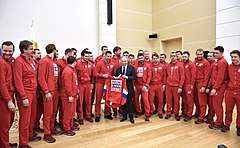
In 2018, the Russian Olympic Committee was disqualified by the International Olympic Committee for doping, but the Russian players were cleared to participate by the IOC under the Olympic flag as the Olympic Athletes from Russia (OAR) using professional Russian hockey players with no previous drug violations and a consistent history of drug testing.[30] Like the rest of the Olympic hockey teams in 2018, the Russian team could not use NHL players due to the league's prohibiting player participation in the Olympics. As a result, the team relied on players from the KHL (15 from a reigning champion, SKA Saint Petersburg, 8 from HC CSKA Moscow and 2 from Metallurg Magnitogorsk).
After a loss in their first game to Slovakia, the OAR team defeated Slovenia and the United States, qualifying for the quarterfinals. The team then defeated Norway and the Czech Republic to reach the finals. The team won the gold medal after a 4–3 overtime victory over the German team in the final. Kovalchuk and Pavel Datsyuk each won their first gold in their fifth Olympic appearance and together with Slava Voynov, were the only players with prior Olympic experience on the team.[31] In its post-Olympics World Ranking, the IIHF considered the OAR team as the Russian team in its rankings.[2] The IIHF considers this victory to be Russia's second gold medal in the Olympics, as they also attributed the 1992 Unified Team gold medal to Russia,[6] however, the IOC does not attribute either of these results to Russia.[32]
After the Olympics, Znarok became a consultant for the Russian National Team. He retired as Russia's most decorated modern head coach, with a World Championship, an Olympic gold medal, and a Euro Hockey Tour victory.[33]
Vorobiev as head coach
Ilya Vorobiev was hired as the interim head coach of the Russian national hockey team in April 2018 for the 2018 IIHF World Championship and the second half of 2017–18 Euro Hockey Tour. In the remainder of Euro Hockey Tour, Vorobiev led the Russian team to a 1–5 record, following the 5–1 record of the Znarok-led team in the first half of 2017–18 Euro Hockey Tour, for the team to finish 6–6 on the season.[34] At the 2018 World Championship, Russia finished second in its group and lost to Canada 4–5 in the quarterfinal, finishing sixth overall. Vorobiev became the first Russian head coach to hold a 6–8 overall record after the Euro Hockey Tour and the World Championship, and the first to hold a 1–8 record against the other Big Six hockey teams. The Russian Hockey Federation renewed Vorobiev's contract. The Russians started 5–1 in the first half of 2018–19 Euro Hockey Tour, improving Vorobiev's overall record to 11–9, and 6–9 against the other Big Six hockey teams.[35]
Tournament record
Olympic Games
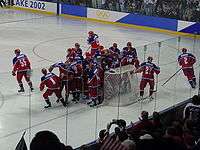
| Games | GP | W | L | T | GF | GA | Coach | Captain | Finish |
|---|---|---|---|---|---|---|---|---|---|
| 1956–1988 | As part of | ||||||||
| As part of | |||||||||
| 8 | 4 | 4 | 0 | 26 | 24 | Viktor Tikhonov | Alexander Smirnov | 4th | |
| 6 | 5 | 1 | 0 | 26 | 12 | Vladimir Yurzinov | Pavel Bure | ||
| 6 | 3 | 2 | 1 | 19 | 14 | Viacheslav Fetisov | Igor Larionov | ||
| 8 | 5 | 3 | 0 | 25 | 18 | Vladimir Krikunov | Alexei Kovalev | 4th | |
| 4 | 2 | 2 | 0 | 16 | 13 | Vyacheslav Bykov | Alexei Morozov | 6th | |
| 5 | 3 | 2 | 0 | 13 | 8 | Zinetula Bilyaletdinov | Pavel Datsyuk | 5th | |
| As | |||||||||
| 6 | 5 | 1 | 0 | 27 | 9 | Oleg Znarok | Pavel Datsyuk | ||
World Championship
| Year | Location | Result |
|---|---|---|
| 1992 | Prague / Bratislava, Czechoslovakia | 5th place |
| 1993 | Dortmund / Munich, Germany | Gold |
| 1994 | Bolzano / Canazei / Milan, Italy | 5th place |
| 1995 | Stockholm / Gävle, Sweden | 5th place |
| 1996 | Vienna, Austria | 4th place |
| 1997 | Helsinki / Turku / Tampere, Finland | 4th place |
| 1998 | Zurich / Basel, Switzerland | 5th place |
| 1999 | Oslo / Lillehammer / Hamar, Norway | 5th place |
| 2000 | Saint Petersburg, Russia | 11th place |
| 2001 | Cologne / Hanover / Nuremberg, Germany | 6th place |
| 2002 | Gothenburg / Karlstad / Jönköping, Sweden | Silver |
| 2003 | Helsinki / Tampere / Turku, Finland | 7th place |
| 2004 | Prague / Ostrava, Czech Republic | 10th place |
| 2005 | Innsbruck / Vienna, Austria | Bronze |
| 2006 | Riga, Latvia | 5th place |
| 2007 | Moscow / Mytishchi, Russia | Bronze |
| 2008 | Quebec City / Halifax, Canada | Gold |
| 2009 | Bern / Kloten, Switzerland | Gold |
| 2010 | Cologne / Mannheim / Gelsenkirchen, Germany | Silver |
| 2011 | Bratislava / Košice, Slovakia | 4th place |
| 2012 | Helsinki, Finland / Stockholm, Sweden | Gold |
| 2013 | Helsinki, Finland / Stockholm, Sweden | 6th place |
| 2014 | Minsk, Belarus | Gold |
| 2015 | Prague / Ostrava, Czech Republic | Silver |
| 2016 | Moscow / Saint Petersburg, Russia | Bronze |
| 2017 | Cologne, Germany / Paris, France | Bronze |
| 2018 | Copenhagen / Herning, Denmark | 6th place |
| 2019 | Bratislava / Košice, Slovakia | Bronze |
| 2020 | Zürich / Lausanne, Switzerland | Cancelled[36] |
World Cup
| Year | GP | W | L | T | GF | GA | Coach | Captain | Finish |
|---|---|---|---|---|---|---|---|---|---|
| 1996 World Cup of Hockey | 5 | 2 | 3 | 0 | 19 | 19 | Boris Mikhailov | Viacheslav Fetisov | 4th |
| 2004 World Cup of Hockey | 4 | 2 | 2 | 0 | 12 | 11 | Zinetula Bilyaletdinov | Alexei Kovalev | 5th |
| 2016 World Cup of Hockey | 4 | 2 | 2 | 0 | 11 | 10 | Oleg Znarok | Alexander Ovechkin | 4th |
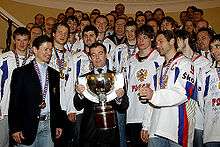
Euro Hockey Tour
The Euro Hockey Tour (EHT) started in 1996 and is held every season between the quartet of European nations of the Big Six nations of ice hockey. The usual format is to have the teams play against each other four times, once in Finland, once in Russia, once in Sweden, and once in the Czech Republic. There are occasional deviations from the format if additional nations, such as Canada, are invited to compete. Russia has won the EHT seven times as of 2018.
EHT 2018–19 Standings
Final standings
| Pos | Team | Pld | W | OTW | OTL | L | GF | GA | GD | Pts |
|---|---|---|---|---|---|---|---|---|---|---|
| 1 | 12 | 6 | 2 | 0 | 4 | 41 | 27 | +14 | 22 | |
| 2 | 12 | 5 | 1 | 2 | 4 | 27 | 29 | −2 | 19 | |
| 3 | 12 | 5 | 0 | 2 | 5 | 29 | 37 | −8 | 17 | |
| 4 | 12 | 4 | 1 | 0 | 7 | 30 | 34 | −4 | 14 |
Euro Hockey Tour medal table
| Country | Gold | Silver | Bronze | Medals |
|---|---|---|---|---|
| 9 | 7 | 6 | 22 | |
| 8 | 6 | 5 | 19 | |
| 4 | 6 | 4 | 14 | |
| 2 | 4 | 8 | 14 |
Russia's Euro Hockey Tour (EHT) Cup medal table
As of the 2019 Carlson Hockey Games
| Tournament | Gold | Silver | Bronze | Medals |
|---|---|---|---|---|
| Karjala Tournament | 7 | 6 | 8 | 21 |
| Channel One Cup | 12 | 5 | 4 | 21 |
| Sweden Hockey Games | 4 | 4 | 8 | 16 |
| Czech Hockey Games | 4 | 6 | 5 | 15 |
| Total | 27 | 21 | 25 | 73 |
Other tournaments
- Deutschland Cup:

- Nissan Cup:

- Northern Lights Tournament:

Team
Current roster
Roster for the 2019 IIHF World Championship.[38][39]
Head coach: Ilya Vorobiev
| No. | Pos. | Name | Height | Weight | Birthdate | Team |
|---|---|---|---|---|---|---|
| 2 | D | Artyom Zub | 1.88 m (6 ft 2 in) | 90 kg (200 lb) | 3 October 1995 | |
| 3 | D | Dinar Khafizullin | 1.81 m (5 ft 11 in) | 84 kg (185 lb) | 1 May 1989 | |
| 4 | D | Vladislav Gavrikov | 1.90 m (6 ft 3 in) | 97 kg (214 lb) | 21 November 1995 | |
| 7 | F | Ivan Telegin | 1.93 m (6 ft 4 in) | 92 kg (203 lb) | 28 February 1992 | |
| 8 | F | Alexander Ovechkin – A | 1.90 m (6 ft 3 in) | 94 kg (207 lb) | 17 September 1985 | |
| 9 | D | Dmitry Orlov | 1.82 m (6 ft 0 in) | 92 kg (203 lb) | 23 July 1991 | |
| 11 | F | Evgeni Malkin – A | 1.90 m (6 ft 3 in) | 84 kg (185 lb) | 31 July 1986 | |
| 13 | F | Sergei Andronov | 1.88 m (6 ft 2 in) | 86 kg (190 lb) | 19 July 1989 | |
| 15 | F | Artyom Anisimov | 1.93 m (6 ft 4 in) | 86 kg (190 lb) | 24 May 1988 | |
| 16 | F | Sergei Plotnikov | 1.88 m (6 ft 2 in) | 90 kg (200 lb) | 3 June 1990 | |
| 22 | D | Nikita Zaitsev | 1.89 m (6 ft 2 in) | 89 kg (196 lb) | 29 October 1991 | |
| 25 | F | Mikhail Grigorenko | 1.89 m (6 ft 2 in) | 95 kg (209 lb) | 16 May 1994 | |
| 31 | G | Ilya Sorokin | 1.88 m (6 ft 2 in) | 78 kg (172 lb) | 4 August 1995 | |
| 40 | G | Alexandar Georgiev | 1.86 m (6 ft 1 in) | 82 kg (181 lb) | 10 February 1996 | |
| 61 | D | Nikita Zadorov | 1.96 m (6 ft 5 in) | 104 kg (229 lb) | 16 April 1995 | |
| 63 | F | Evgenii Dadonov | 1.80 m (5 ft 11 in) | 84 kg (185 lb) | 12 March 1989 | |
| 71 | F | Ilya Kovalchuk – C | 1.90 m (6 ft 3 in) | 100 kg (220 lb) | 15 April 1983 | |
| 77 | F | Kirill Kaprizov | 1.78 m (5 ft 10 in) | 87 kg (192 lb) | 26 April 1997 | |
| 86 | F | Nikita Kucherov | 1.80 m (5 ft 11 in) | 77 kg (170 lb) | 17 June 1993 | |
| 88 | G | Andrei Vasilevskiy | 1.90 m (6 ft 3 in) | 90 kg (200 lb) | 25 July 1994 | |
| 89 | D | Nikita Nesterov | 1.80 m (5 ft 11 in) | 83 kg (183 lb) | 28 March 1993 | |
| 92 | F | Evgeny Kuznetsov | 1.82 m (6 ft 0 in) | 83 kg (183 lb) | 19 May 1992 | |
| 94 | F | Alexander Barabanov | 1.79 m (5 ft 10 in) | 89 kg (196 lb) | 17 June 1994 | |
| 97 | F | Nikita Gusev | 1.78 m (5 ft 10 in) | 76 kg (168 lb) | 8 July 1992 | |
| 98 | D | Mikhail Sergachev | 1.90 m (6 ft 3 in) | 98 kg (216 lb) | 25 June 1998 |
Coaching history
- Olympics
- 1994 – Viktor Tikhonov
- 1998 – Vladimir Yurzinov (Pyotr Vorobyov, Zinetula Bilyaletdinov)
- 2002 – Viacheslav Fetisov (Vladimir Yurzinov, Vladislav Tretiak)
- 2006 – Vladimir Krikunov (Vladimir Yurzinov, Boris Mikhailov)
- 2010 – Vyacheslav Bykov (Igor Zakharkin)
- 2014 – Zinetula Bilyaletdinov (Valery Belov, Dmitry Yushkevich, Igor Nikitin, Valeri Belousov, Vladimir Myshkin)
- 2018 – Oleg Znarok (Harijs Vītoliņš, Ilya Vorobyov, Rashit Davydov, Igor Nikitin, Alexei Zhamnov)
- World Championships
- 1993 – Boris Mikhailov (Pyotr Vorobyov, Igor Tuzik, Gennady Tsygurov)
- 1994 – Boris Mikhailov (Pyotr Vorobyov, Igor Tuzik, Gennady Tsygurov)
- 1995 – Boris Mikhailov (Pyotr Vorobyov, Igor Tuzik, Gennady Tsygurov)
- 1996 – Vladimir Vasiliev (Gennady Tsygurov, Viktor Tikhonov)
- 1997 – Igor Dmitriev (Boris Mikhailov, Igor Tuzik)
- 1998 – Vladimir Yurzinov (Pyotr Vorobyov, Zinetula Bilyaletdinov)
- 1999 – Alexander Yakushev (Pyotr Vorobyov, Zinetula Bilyaletdinov)
- 2000 World Championships – Alexander Yakushev (Pyotr Vorobyov, Zinetula Bilyaletdinov)
- 2001 World Championships – Boris Mikhailov (Valeri Belousov, Vladimir Krikunov )
- 2002 – Boris Mikhailov (Valeri Belousov, Vladimir Krikunov)
- 2003 – Vladimir Plyushchev (Alexander Yakushev, Nikolai Tolstikov)
- 2004 – Viktor Tikhonov
- 2005 – Vladimir Krikunov (Vladimir Yurzinov, Boris Mikhailov)
- 2006 – Vladimir Krikunov (Vladimir Yurzinov, Boris Mikhailov)
- 2007 – Vyacheslav Bykov (Igor Zakharkin)
- 2008 – Vyacheslav Bykov (Igor Zakharkin)
- 2009 – Vyacheslav Bykov (Igor Zakharkin)
- 2010 – Vyacheslav Bykov (Igor Zakharkin, Valeri Bragin, Andrei Nazarov)
- 2011 – Vyacheslav Bykov (Igor Zakharkin)
- 2012 – Zinetula Bilyaletdinov (Valery Belov, Dmitry Yushkevich, Igor Nikitin, Vladimir Myshkin)
- 2013 – Zinetula Bilyaletdinov (Valery Belov, Dmitry Yushkevich, Igor Nikitin, Vladimir Myshkin)
- 2014 – Oleg Znarok (Harijs Vītoliņš, Vladimir Fedosov, Igor Nikitin, Yuri Zhdanov, Rashit Davydov, Oleg Kupryanov)
- 2015 – Oleg Znarok (Harijs Vītoliņš, Vladimir Fedosov, Igor Nikitin, Yuri Zhdanov, Rashit Davydov, Oleg Kupryanov)
- 2016 – Oleg Znarok (Harijs Vītoliņš, Ilya Vorobyov, Rashit Davydov, Igor Nikitin)
- 2017 – Oleg Znarok (Harijs Vītoliņš, Ilya Vorobyov, Rashit Davydov, Igor Nikitin)
- World Cup
- 1996 – Boris Mikhailov
- 2004 – Zinetula Bilyaletdinov
- 2016 – Oleg Znarok
Notes
- Some controversy exists over how many Olympic gold medals should be attributed to the Russian national team. The IIHF and Ice Hockey Federation of Russia consider Russia to have won gold at the Olympics twice, attributing the 1992 gold medal victory to the Russian national team as the immediate successor of the CIS team, as well as the 2018 gold medal by the Olympic Athletes from Russia.[5][6] However, the International Olympic Committee does not recognize Russia as ever having won the gold medal in an Olympic tournament, as the 1992 and 2018 tournaments were won by athletes from the Unified Team and Olympic Athletes from Russia delegations, respectively, and not by a Russian delegation.[7]
References
- "IIHF Men's World Ranking". IIHF. 24 April 2020. Retrieved 24 April 2020.
- "World Ranking released". International Ice Hockey Federation. 25 February 2018.
- "NHL announces World Cup of Hockey for 2016". The Canadian Press. 24 January 2015. Retrieved 29 January 2015.
- "Euro Hockey Tour details - Eurohockey.com". www.eurohockey.com.
- IIHF (2008). "Team with no name wins Olympic gold". IIHF.com. Retrieved 12 November 2017.
- IIHF. "OLYMPIC ICE HOCKEY TOURNAMENTS, MEN". IIHF.com. Retrieved 26 February 2018.
- IOC (2018). "ICE HOCKEY MEN". International Olympic Committee. Retrieved 26 February 2018.
- Stepan Chaushyan (10 December 2013). "Олимпийские надежды: сборная России по хоккею" [Olympic Hopes: The Russian Hockey Team]. Argumenty i Fakty (in Russian). Retrieved 14 May 2017.
- "Строительство "красной машины". Часть 1" [The Construction of the "Red Machine". Part 1] (in Russian). Russian Hockey Federation. Retrieved 14 May 2017.
- IIHF (2008). "Soviets hammer Canada, win gold at their first Worlds". IIHF.com. Retrieved 14 May 2017.
- IIHF (2008). "Team with no name wins Olympic gold". IIHF.com. Retrieved 14 May 2017.
- IIHF (2008). "PROTESTING AMATEUR RULES, CANADA LEAVES INTERNATIONAL HOCKEY". IIHF.com. Retrieved 25 August 2017.
- Coffey, p. 59
- "Amateur vs. Professional in Cold War Hockey: A Consideration of Relative Skill Levels and Their Implications for Professional Hockey Today". Notre Dame Journal of International & Comparative Law. 21 February 2018. Retrieved 23 February 2020.
- IIHF (2008). "Breakup of old Europe creates a new hockey world". IIHF.com. Retrieved 14 May 2017.
- "Все матчи сборной России по хоккею - 1991/1992". hockeyarchives.ru.
- Nadel, Mike (22 February 1998). "Czechs Win Hockey Gold". APNewArchive.com. Retrieved 14 May 2017.
- Eisenberg, John (21 February 1994). "Red-letter days over for Russian hockey Lillehamer 94". Baltimore Sun. Retrieved 14 August 2019.
- "About the KHL : Kontinental Hockey League (KHL)". en.khl.ru.
- "Bykov named Russia coach". Eurosport. 12 August 2006.
- "Greatest Russian Hockey Players of All Time". Sports Illustrated. 12 February 2014. Retrieved 13 November 2018.
- "Russia wins 2008 Ice Hockey World Championship in Canada". 19 May 2008.
- Students, SRAS (3 December 2009). "Russians on Ice: A Brief Overview of Soviet and Russian Hockey".
- "Vyacheslav Bykov at eliteprospects.com". www.eliteprospects.com.
- http://www.iihf.com/competition/272/news/news-singleview-2012/?tx_ttnews%5Btt_news%5D=6797&cHash=00683ecb0ef850cf92e13f53ae61df3e
- "Zinetula Bilyaletdinov Hockey Stats and Profile at hockeydb.com". www.hockeydb.com.
- Times, The Moscow (26 May 2014). "Russia Beats Finland to Win Ice Hockey World Championship". The Moscow Times.
- "Land of winners - 2014 WM - International Ice Hockey Federation IIHF". www.iihfworlds2014.com.
- "Awards for Russian national ice hockey team". President of Russia.
- Ruiz, Rebecca C.; Panja, Tariq (5 December 2017). "Russia Banned From Winter Olympics by I.O.C." The New York Times. Retrieved 5 December 2017.
- https://www.olympicchannel.com/en/video/detail/ice-hockey-veterans-lead-oar-contingent/
- "Russian Federation - National Olympic Committee (NOC)". Retrieved 25 March 2020.
- Панышев, Павел. "Знарок не везёт сборную на ЧМ. Почему замена на Воробьёва – это правильно". www.championat.com.
- "Euro Hockey Tour - Hokej". www.sport.cz.
- "Euro Hockey Tour details". Eurohockey.com. Retrieved 28 December 2018.
- Steiss, Adam. "2020 IIHF Ice Hockey World Championship cancelled". iihf.com. IIHF. Retrieved 21 March 2020.
- "Channel One Cup". Euro-Hockey-Tour. Retrieved 28 April 2018.
- "Состав национальной сборной России на чемпионат мира". fhr.ru. 8 May 2019.
- "2019 IIHF World Championship roster" (PDF).
External links
| Wikimedia Commons has media related to Russia men's national ice hockey team. |